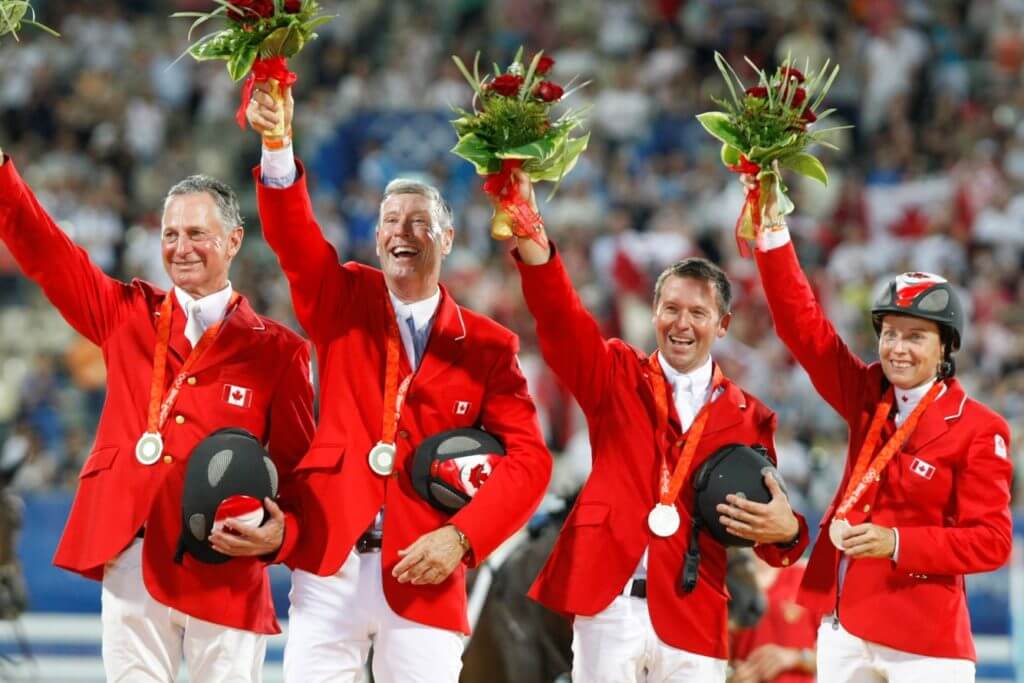Ian Millar

Equestrian (Retired)
Business Administration – Class of 1968
College was not one of young Ian Millar’s first priorities. In his teens, the future Olympic equestrian didn’t even want to finish high school. “I was totally horse-crazy. I just wanted to be in the barn all day,” he recalls with a hearty laugh.
It was Millar’s good fortune that his parents were adamant he get an education. They were fully supportive of his wish to ride. But their support was contingent on his commitment to post-secondary. Algonquin College – then known as the Eastern Ontario Institute of Technology, or EOIT – was offering the practical education Millar thought would serve him well.
“A good friend of mine, John Woods, said EOIT was the way to go. I thought, ‘OK, I’ll take business administration and then figure my life out.’”
Millar more than figured it out. Today he is among the most honoured champions in his field. He competed as a rider in 10 Olympic Games, breaking the world record for most Olympic appearances across all sports in 2012. He won a silver Olympic medal in Beijing in 2008, and also earned nine medals in as many appearances at the Pan American Games. He is a Member of the Order of Canada, and has been inducted into the Ontario Sports Hall of Fame, the Jump Canada Hall of Fame, and the Canadian Sports Hall of Fame.
In addition, Millar is a successful businessman. Although he is retired from competition, he still runs the 600-acre Millar Brooke Farm in Perth he bought with his wife Lynn in 1972. He works with his son, daughter and daughter-in-law at the international horse farm and training operation. It features a six-acre Grand Prix field where horses and riders learn the challenges of Olympic-calibre obstacle courses.
Millar credits the lessons he learned in his time at the College for a good portion of his success in business. By way of example, he tells the story of one professor who led a course in business law. “He’d give us a business case with a problem and say, ‘I want a solution that does three things: it’s ethical, it’s moral and it makes money.’
“We would spend hours in the cafeteria or at a bar talking endlessly about possible solutions. What a great thing to learn and to apply throughout your life. And that’s just one of the practical lessons I learned at the College. Almost everything I learned at Algonquin, I use almost every day.”
Millar was born in Halifax in 1947. His father was in the army, remaining in the military after the Second World War and moving his young family frequently around the country. Up to age 10, Millar lived in Ottawa, where milk was still delivered to homes in horse-drawn wagons. The boy became great friends with the local milkman, who would allow him to sit in the box seat and take the reins.
“I drove my parents crazy saying I wanted to learn riding,” he says. A family friend had a cottage the Millars visited at Gull Lake in Central Alberta, and there was a small country store nearby. “There were two horses there one day, tied to a rail, and a sign saying, ‘Horses for rent.’ That was it. I was on my way.”
The cowboy taking care of the horses was the son of a local rancher, who was making extra money renting out the horses. Soon Millar was running the little business and riding the horses himself when they weren’t being rented to others. It was a Boy’s Own dream, riding horses alone and with friends much of the day and evening on the back country’s winding sand roads.
By fall, the whole family was enrolled in riding classes in Edmonton. At 15, Millar and his family were back in Ottawa, where he continued to work for people in the area, riding horses for them and teaching and training.
It’s a long way from the farms of the Ottawa Valley to the Olympics. But Millar credits natural ability, good luck, the business skills his education gave him and a lot of hard work to reach the pinnacle of his field. He says he learned sales in school and practised it in life. Knowing how sales worked helped him put a syndicate together, for instance, so he could buy his own horse to ride.
“If I hadn’t known sales, I couldn’t have assembled the syndicate or bought a horse. Bottom line, I would never have gone to the Olympics. Algonquin was a key part of it.”
Asked to name the highlights of his long and celebrated career, Millar hesitates, then picks two. There were the Olympics in Beijing in 2008 where he needed to jump a clean round for the team to take home a medal. The pressure, he says, was extraordinary. This was in August. Lynn, his wife of 47 years had passed away in March. His son and daughter were there, as were countless other Canadians.
“Everyone wanted a medal so badly,” Millar recalls. “Canada hadn’t earned a medal in show jumping in 50 goddamned years. We got it done.”
Then he highlights the Spruce Meadows Grand Prix, the richest grand prix in the world, four years ago in Calgary. Millar, who was 69 years old at the time, was considered a long shot, and his competitor was just 22 years old. “She went first and she did damn well,’ he says. “But she left me just a little bit of room. The result was another win for Canada.”
As our interview comes to a close, Millar signs off saying he has an appointment, one much like many others that have occupied him happily for decades.
“I have another lesson and another horse to ride,” he says. “I’ve got to tell you, it’s a lot of fun.”